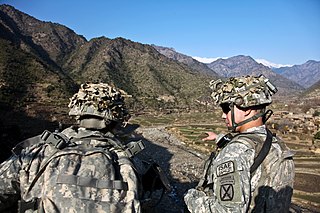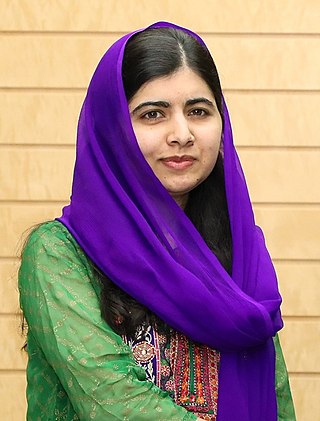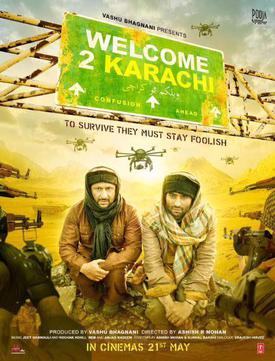Taliban is an Afghan Islamist militant organisation.
Taliban may also refer to:
- Taliban (gang), Kenyan criminal organization
- Talibans (song), a song written by Jamaican-born Kittitian recording artist Byron Messia
Taliban is an Afghan Islamist militant organisation.
Taliban may also refer to:

Afghanistan, officially the Islamic Emirate of Afghanistan, is a landlocked country located at the crossroads of Central Asia and South Asia. Referred to as the Heart of Asia, it is bordered by Pakistan to the east and south, Iran to the west, Turkmenistan to the northwest, Uzbekistan to the north, Tajikistan to the northeast, and China to the northeast and east. Occupying 652,864 square kilometers (252,072 sq mi) of land, the country is predominantly mountainous with plains in the north and the southwest, which are separated by the Hindu Kush mountain range. Kabul is the country's largest city and serves as its capital. According to the World Population review, as of 2021, Afghanistan's population is 40.2 million. The National Statistics Information Authority of Afghanistan estimated the population to be 32.9 million as of 2020.

Operation Enduring Freedom (OEF) was the official name used by the U.S. government for both the first stage (2001–2014) of the War in Afghanistan (2001–2021) and the larger-scale Global War on Terrorism. On 7 October 2001, in response to the September 11 attacks, President George W. Bush announced that airstrikes targeting Al-Qaeda and the Taliban had begun in Afghanistan. Beyond the military actions in Afghanistan, Operation Enduring Freedom was also affiliated with counterterrorism operations in other countries, such as OEF-Philippines and OEF-Trans Sahara.

The Taliban, which also refers to itself by its state name, the Islamic Emirate of Afghanistan, is a militant organization in Afghanistan with an ideology comprising elements of Pashtun nationalism and the Deobandi current of Islamic fundamentalism. It ruled approximately three-quarters of the country from 1996 to 2001, before being overthrown following the American invasion. It recaptured Kabul on 15 August 2021 following the departure of most coalition forces, after nearly 20 years of insurgency, and currently controls all of the country. However, its government is not recognized by any country. The Taliban government has been internationally condemned for restricting human rights in Afghanistan, including the right of women and girls to work and to have an education.

Hamid Karzai is an Afghan politician who served as the fourth president of Afghanistan from July 2002 to September 2014, including as the first elected president of the Islamic Republic of Afghanistan from December 2004 to September 2014. He previously served as Chairman of the Afghan Interim Administration from December 2001 to July 2002. He is the chief (khān) of the Popalzai Durrani tribe of Pashtuns in Kandahar Province.
War in Afghanistan, Afghan war, or Afghan civil war may refer to:

The Taliban insurgency began after the group's fall from power during the 2001 War in Afghanistan. The Taliban forces fought against the Afghan government, led by President Hamid Karzai, and later by President Ashraf Ghani, and against a US-led coalition of forces that has included all members of NATO; the 2021 Taliban offensive resulted in the collapse of the government of Ashraf Ghani. The private sector in Pakistan extends financial aid to the Taliban, contributing to their financial sustenance.
Farah City District is a district in Farah province, Afghanistan, containing the main city of Farah.The city of Farah has a population of 54,000. it has 6 districts and a total land area of 2,949 Hectares. The total number of dwellings in this city are 5,299.

The 1996–2001 Afghan Civil War or the Fifth Afghan Civil War took place between the Taliban's conquest of Kabul and their establishing of the Islamic Emirate of Afghanistan on 27 September 1996, and the US and UK invasion of Afghanistan on 7 October 2001: a period that was part of the Afghan Civil War that had started in 1989, and also part of the war in Afghanistan that had started in 1978.
Muhammad Omar, and other spellings such as Mohamed Omer, may refer to the following people:

The Pakistani Taliban, officially called the Tehreek-e-Taliban-e-Pakistan, is an umbrella organization of various Islamist armed militant groups operating along the Afghan–Pakistani border. Formed in 2007 by Baitullah Mehsud, its current leader is Noor Wali Mehsud, who has publicly pledged allegiance to the Afghan Taliban. The Pakistani Taliban share a common ideology with the Afghan Taliban and have assisted them in the 2001–2021 war, but the two groups have separate operation and command structures.

The War in Afghanistan was an armed conflict from 2001 to 2021. It was the direct response to the September 11 attacks. It began when an international military coalition led by the United States launched an invasion of Afghanistan, toppling the Taliban-ruled Islamic Emirate and establishing the internationally recognized Islamic Republic three years later. The conflict officially ended with the 2021 Taliban offensive, which overthrew the Islamic Republic, and re-established the Islamic Emirate. It was the longest war in the military history of the United States, surpassing the length of the Vietnam War (1955–1975) by approximately 6 months.

The Hazaras have long been the subjects of persecution in Afghanistan. The Hazaras are mostly from Afghanistan, primarily from the central regions of Afghanistan, known as Hazarajat. Significant communities of Hazara people also live in Quetta, Pakistan, and in Mashad, Iran, as part of the Hazara and Afghan diasporas.

Malala Yousafzai is a Pakistani female education activist and the 2014 Nobel Peace Prize laureate at the age of 17. She is the world's youngest Nobel Prize laureate, the second Pakistani and the first Pashtun to receive a Nobel Prize. Yousafzai is a human rights advocate for the education of women and children in her native homeland, Swat, where the Pakistani Taliban had at times banned girls from attending school. Her advocacy has grown into an international movement, and according to former Prime Minister Shahid Khaqan Abbasi, she has become Pakistan's "most prominent citizen."

Welcome 2 Karachi is a 2015 Indian Hindi-language black comedy film directed by Ashish R Mohan and produced by Vashu Bhagnani. The film stars Arshad Warsi and Jackky Bhagnani as pivotal leads. Music directors Jeet Ganguly and Rochak Kohli composed music for this film. The film was released on 28 May 2015.

Mullah Hibatullah Akhundzada, also spelled Haibatullah Akhunzada, is an Afghan Deobandi Islamic scholar, cleric, and jurist who is the supreme leader of Afghanistan. He has led the Taliban since 2016, and came to power with its victory over U.S.-backed forces in the 2001–2021 war. A highly reclusive figure, he has almost no digital footprint except for an unverified photograph and several audio recordings of speeches.

"Fortress of Islam, Heart of Asia" is an Afghan mujahidin battle song composed in 1919 by Ustad Qasim. It was adopted as the national anthem of the Islamic State of Afghanistan from 1992 to 2006.

The Islamic State–Taliban conflict is an ongoing armed conflict between the Islamic State and the Taliban in Afghanistan. The conflict escalated when militants who were affiliated with Islamic State – Khorasan Province killed Abdul Ghani, a senior Taliban commander in Logar province on 2 February 2015. Since then, the Taliban and IS-KP have engaged in clashes over the control of territory, mostly in eastern Afghanistan, but clashes have also occurred between the Taliban and IS-KP cells which are located in the north-west and south-west.

The Islamic Republic of Afghanistan was a presidential republic that ruled Afghanistan from 2004 to 2021. The state was established to replace the Afghan interim (2001–2002) and transitional (2002–2004) administrations, which were formed after the 2001 United States invasion of Afghanistan that had toppled the partially recognized Taliban-ruled Islamic Emirate of Afghanistan. However, on 15 August 2021, the country was recaptured by the Taliban, which marked the end of the 2001–2021 war, the longest war in US history. This led to the overthrow of the Islamic Republic, led by President Ashraf Ghani, and the reinstatement of the Islamic Emirate under the control of the Taliban. While the United Nations still recognizes the Islamic Republic as the legitimate government of Afghanistan, this toppled regime controls no portion of the country today, nor does it operate in exile. It effectively no longer exists. The Islamic Emirate is the de facto ruling government. The US–Taliban deal, signed on 29 February 2020 in Qatar, was one of the critical events that caused the collapse of the Afghan National Security Forces (ANSF). Following the deal, the US dramatically reduced the number of air attacks and deprived the ANSF of a critical edge in fighting the Taliban insurgency, leading to the Taliban takeover of Kabul.

The "Afghan National Anthem" was the de jure national anthem of the internationally recognized Islamic Republic of Afghanistan used since 2006 but fell into disuse in 2021. The lyrics were written by Abdul Bari Jahani, and the music was composed by German-Afghan composer Babrak Wassa. It was de facto replaced by "This Is the Home of the Brave" after the Taliban takeover in 2021.

"This Is the Home of the Brave" is a Pashto-language nasheed and the national anthem of the Islamic Emirate of Afghanistan. It is an a cappella song, meaning that it does not contain musical instruments, as instruments are considered haram by the Taliban. This Nasheed is based on the communist era song "Da De Azadi Khawra".